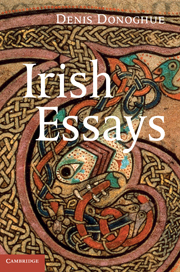4 - Three Presences: Yeats, Eliot, Pound
Published online by Cambridge University Press: 05 June 2012
Summary
On April 2, 1916 one of Yeats's plays for dancers, At the Hawk's Well, received its first performance in Lady Emerald Cunard's drawing-room in Cavendish Square, London before an invited audience. Michio Ito danced the Guardian of the Well. The guests included Ezra Pound and T. S. Eliot. For all I know, this may have been the only afternoon on which Yeats, Eliot, and Pound were together in the same room. Many years later, Samuel Beckett wrote a play, like At the Hawk's Well, about waiting; waiting for someone who is supposed to arrive but doesn't, a variant of waiting for a transforming flow of water which is never received because the guardian of the well distracts those who are longing for it. In Happy Days Winnie utters the first line of At the Hawk's Well, “I call to the eye of the mind,” one of many literary allusions that she recalls – or rather, that Beckett recalls on her behalf. I draw a loose connection between these occasions to suggest a literary context for the relations I propose to describe: Yeats and Eliot, Yeats and Pound.
We know when Eliot converted to the Anglican Communion – he made his formal profession on June 9, 1927 – but we don't know precisely when he converted to Yeats: that took much longer. The first time he wrote formally about Yeats was in the Athenaeum, the issue for July 4, 1919, a memorably severe review of the reprinted The Cutting of an Agate.
- Type
- Chapter
- Information
- Irish Essays , pp. 79 - 97Publisher: Cambridge University PressPrint publication year: 2011



